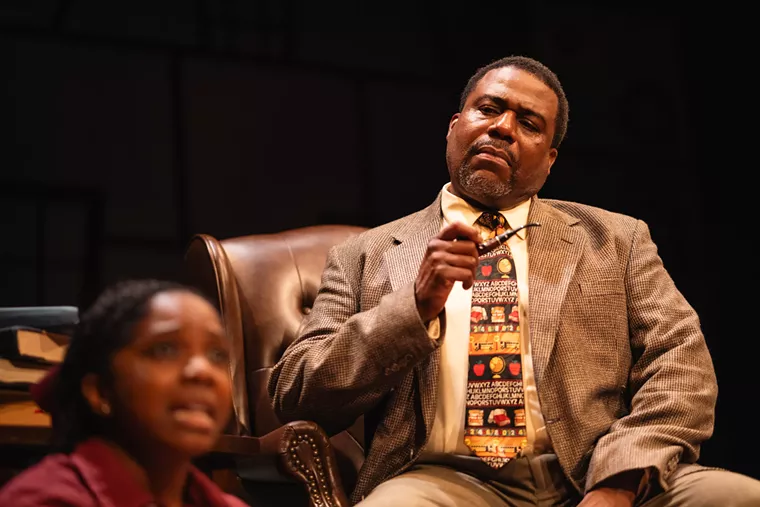Review: Akeelah and the Bee at The Ensemble Theatre
Spelling bees.
Back in the late 1990s and early 2000s, they were certainly having a moment.
They were the topic of an Oscar-nominated documentary, the Scripps National Spelling Bee was regularly televised on ESPN, and every year it seemed some odd tic or quirky personality would go viral – or what passed for viral at the time. Remember the kid who fainted and, quite dramatically, stood right up and correctly spelled his word like nothing had happened? I do. And, of course, spelling bees made it to the big screen with the 2006 film Akeelah and the Bee.
Now, almost 20 years later, Cheryl L. West’s 2015 stage adaptation of writer-director Doug Atchison’s film is serving as The Ensemble Theatre’s season opener, and the question is, was it lightning in a bottle or does the story in Akeelah and the Bee still resonate today?
The play begins with 11-year-old Akeelah Anderson of Chicago, Illinois, waking up screaming after hearing gunshots outside her window. We quickly learn that Akeelah lives in a tough neighborhood, in an apartment with her mother, an overworked nursing assistant, and her older brother, an unemployed high school dropout, and attends a school, Southside Middle School, where, if the place ever had better days, they are now long gone.
Akeelah has an aptitude for spelling, a gift she traces back to her late father, but she wants no part of “that spelling thing” because kids at school make fun of her for it. When she wins the school spelling bee, however, the principal, desperate to change the school’s image, sees it as an opportunity. He believes she can go far – to district, then state, and maybe nationals – but she’ll need proper coaching. He encourages her to train with Dr. Joshua Larabee, a professor and former English department head at Northwestern. More importantly, though, Larabee once made it to the National Spelling Bee himself.
Bria Washington and Jason E. Carmichael in The Ensemble Theatre’s production of Akeelah and the Bee.
Photo by Jordan Guidry
Though they get off on the wrong foot, Dr. Larabee does agree to coach Akeelah, but the road to the national title in Washington, D.C. proves to be lined with obstacles, the least of which is that Akeelah’s navigating it all behind her mother’s back.
West’s adaptation premiered at the Minneapolis Children’s Theatre Company in 2015. As such, though relatively loyal to the 2006 film, it may be even more family-friendly. The big beats are all still present, as are the inherent themes (race and class, inner-city violence, grief, self-worth, the power of community). All together, they add up to a classic underdog story. It’s easy to root for Akeelah because, as conventional and fairly formulaic as the story is, it’s got a lot of heart.
Director Eileen J. Morris leans into that heart by emphasizing the community around Akeelah, which makes the lively production welcoming like a warm hug. Strong performances from the cast also keep the story from coming across as trite, starting with Bria Washington as Akeelah.
Washington is a terrific Akeelah. She is child-like in her enthusiasm, and the ease with which she can go from excitable and talkative to overwhelmed with emotion perfectly reflects the balancing act Akeelah often finds herself in as she tries to find her footing in the world. Washington has great chemistry with all of her castmates, but her interactions with Jason E. Carmichael are most memorable.
Carmichael puts his commanding presence and booming voice to good use as Dr. Larabee who, under the cold exterior and impeccable posture, is revealed to have a secret pain. As they warm up to each other, his relationship with Washington’s Akeelah becomes utterly charming, as in the scene where he introduces a jump rope into her spelling routine.
April Wheat, Bria Washington, and Konnor Sheppard in The Ensemble Theatre’s production of Akeelah and the Bee.
Photo by Jordan Guidry
As mom Gail, April Wheat is a foil, but an unintentional one. As such, in Wheat’s hands, she is never unlikable. As Reggie, Akeelah’s brother, Konnor Sheppard is the ideal mix of caring and troubled. Reggie is a sweetheart of a brother, and his relationship with Akeelah is the best drawn of all. Rounding out Akeelah’s initial support system is Kendal Thomas’s Georgia, who is loud in her support of her best friend and flashy in style.
James West III skillfully plays the perpetually “on it” building super Drunk Willie, a kindly older man who (as his name implies) takes more than his fair share of nips, and Principal Welch, a beleaguered man not afraid to blackmail a child, or plead on bended knee, if it might benefit his school. Joyce Anastasia Murray gets her share of laughs as Batty Ruth, a bigmouthed, nosy neighbor who shares an unexpected past with Drunk Willie.
When we first meet Joshua Nguyen as Dylan, he is frustratingly arrogant (you know he’s doing it right when the audience can’t help but groan and drop oh god’s when he speaks. Nguyen shows another side of Dylan as the play progresses, especially as Johnny Barton establishes his antagonistic role as Dylan’s Dad, a man who demands nothing less than excellence from his son and is aptly described as “a little Hitler” by Georgia.
Utility players in the cast include Helen Rios, who plays (among others) Akeelah’s nearly nonverbal schoolmate Izzy, seemingly too shy to speak or lift her head, and an over-polished reporter working nationals; Sannia Bell, as rich girl Trish and two spelling bee competitors (one offensively Texan and the other an early victim of the pressure the kids feel to win); and Aliyah Robinson, whose turn as Ratchet Rhonda, the attitudinal cheerleader who shakes down Akeelah for snacks, outshines her more prim role as a spelling bee judge. Johnny Kelley appears first as jokester Chucky, but settles into the character Javier, a dorky and considerate friend to Akeelah.
With almost half the cast playing double (or triple or quadruple) duty, Costume Designers/Dressers Dawn Joyce Peterson and Ann Ridley, as well as Sharon Ransom’s hair and makeup, do yeoman’s work distinguishing character. Equally supportive is Liz Freese’s set, which is beautifully decorated with fun Pop Art, comic book-style illustrations, which pop under Kris Phelps’s lighting design.
Not only did the set have a three-dimensional quality, with its layered levels, the use of the theater’s entrances and exits, aisle, and seats gave the cast even more space to play. It is a nice touch having cast sit in the audience, as during the final, when Akeelah’s camp forms a cheering section on one side of the audience while Dylan’s dad takes a seat on the other.
Adrian Washington’s sound designs complete the world in both comedic (Reggie’s baby at the district bee) and serious (the ever-present threat of gun violence nearby) ways. They also establish joy, as when musical interludes and dance, with choreography from Monica Josette, erupt on stage. One sound-related quibble is that it seemed to dip in the second act, with the dialogue getting noticeably quieter, but I’ll assume that’s a fluke that will be fixed going forward.
The verdict is that Akeelah and the Bee is designed to make viewers feel good and, in that, it hits the mark. Though it has its overly sappy moments, it’s here to entertain and inspire, which it can do for the right audience – meaning those that are not grinchy about a good time and a happy ending. And these days, who wants to be a grinch about a good time and a happy ending? We can certainly use both wherever we can find them.

Reign Bowers is an outdoor enthusiast, adventure seeker, and storyteller passionate about exploring nature’s wonders. As the creator of SuperheroineLinks.com, Reign shares inspiring stories, practical tips, and expert insights to empower others—especially women—to embrace the great outdoors with confidence.







Post Comment